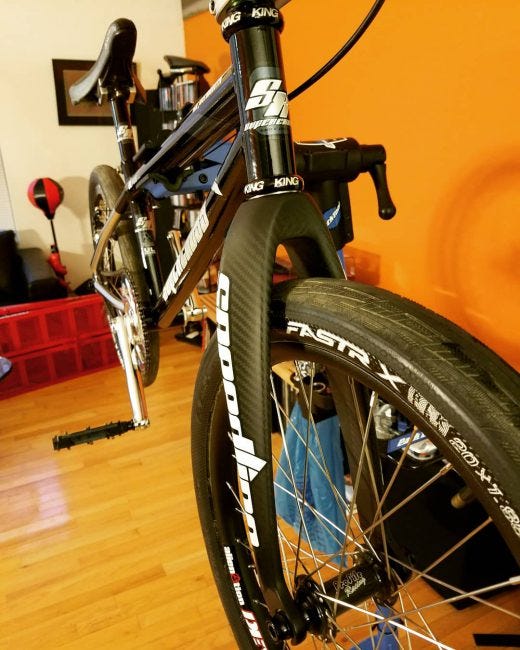In Which The Author Learns Some Hard Truths About American Bicycle Manufacturing

Last month, I pointed an emerald-green S63 AMG across the California desert separating Pasadena from Apple Valley. My purpose: to meet up with my old pal Bill Ryan, owner of Supercross BMX. I hadn't seen Bill for more than a decade and a half, although we had kept up a sporadic conversation via email and social media. My plan was to order a new race frame to replace the 2001-vintage Supercross UL that Bill had custom-built for me and maybe to make some plans for my son's next race bike.
Bill was in fine fettle when I arrived and we chatted for the better part of two hours. "Let me give you the tour," he said. We walked through a series of warehouses. "This is where the fabrication line was... this was where we painted the frames... Right there was where we did all the machining and drilling for the stems." And as we walked it dawned on me that every single drill, every single jig, and every single fixture I saw was coated with the thick dust of long neglect.
We returned to his office, where a massive whiteboard detailed every incoming shipment of frames and parts along with cost, supplier, and various conditions regarding delivery. Almost without exception, the names of the contractors were established Taiwanese OEM cycle suppliers.
"Bill," I said, "I don't understand it. Fifteen years ago you were making a ton of stuff here. Regular production, custom builds, small parts. What happened?"
"Well," he exhaled, and some of his infamous manic energy seemed to evaporate, "...we're in California."
California Proposition 65 establishes specific permissible levels of lead, phthalates, and other chemicals for manufacturing operations in the state. Over and above that, the Obama administration drastically elevated the requirements for testing and verification of bicycles with "child" wheel sizes of 24" and below.
So what does that mean? Well, back when Supercross BMX was founded the process of making a BMX frame was simple:
* Weld up frame * Apply paint or chrome * Sell it
Simple as that. Today, however, you would have to add a few extra steps:
* Test each combination of size, color, and features for: - Lead levels - phthalate levels - All other California 65 requirements * Perform destructive testing to meet CPSC requirements * Add whatever ridiculous features are required for CPSC requirements
Furthermore, the testing has to be third-party, which means that in addition to fronting the money for your materials, labor, and manufacturing space you are also fronting the money for third-party testing. Which isn't cheap. Not only are you losing product when you submit it to testing, you are paying money that has to then be recouped over short parts runs.
It was once common for Supercross and other companies to make runs of 100 components or less, in varying finishes and colors. To do that in California today would increase the price of those parts by a factor of five or even ten.
Alternately, you can do "the right thing" and send your production to Taiwan. They will come up with the compliance certificates, and if nobody in California is able to verify them that doesn't seem to bother the mandarins on either shore. They have labor costs that allow for plenty of wastage in production. Last but not least, they will assume the burden of CPSC compliance --- knowing that if the CPSC ever hammers them into the ground with fines, it's nothing but a shell importer taking the blame.
Bill Ryan is no fool. You don't keep a BMX company alive for thirty years and buy Dinan-tuned Bimmers with the profits if you're anything besides razor-sharp. He developed Taiwanese production contacts. He developed a quality control system that stood between the island and the customer on the BMX track. Most importantly, he went past the main contractors to audit and ensure the quality and provenance of the raw materials involved.
He handed me a "Speedline" carbon fiber fork. It was designed by him. The carbon fiber is made by Toray in Japan at his order. Then it is laid up in Taiwan. When it arrives, he inspects them. The fork he showed me was utterly flawless. In fact, it was woven better than the carbon fiber dash panel on the AMG I'd driven to see him. He suggested that I take it home and try it out.
"Oh no," I said. "I'm using ---" and I gave him the name of a shop that makes heat-treated steel forks in the United States.
"He and I use the same manufacturer," Bill laughed. "They do the final finishing in the States. Anything more than that and they would have to certify."
I frowned. Then I took the fork. Carried it on when I hopped my Delta red-eye. Put it on my USA-made Supercross frame. We will see what happens. I think Bill knows his stuff and I'm not afraid of the part failing. But I wish more than anything that I'd walked into that office and found people laying up carbon fiber the same way they do at Rainsong Guitars in Seattle. At least I know a little bit more about how the sausage is made. And I thought about a phrase I read a while ago:
'If I had but one bullet and were faced by both an enemy and a traitor, I would let the traitor have it.'
The overseas manufacturers are the enemies of American production, the enemies of American jobs, the enemies of American prosperity. But they are merely enemies. The government entities that make it cheaper to hand your business to China, even if it's the "good" part of China? Save your bullet, metaphorical of course, for them.

